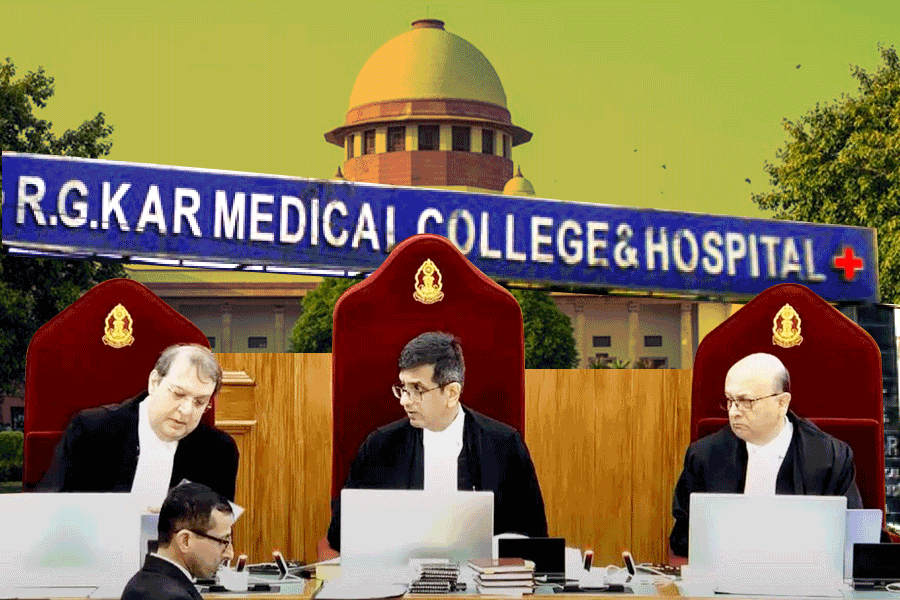The Supreme Court expressed concern on Tuesday over the lack of workplace safety in healthcare institutions and said the country cannot wait for a rape or killing for real changes to take place on the ground.
The apex court was hearing a suo-motu case related to the alleged rape and killing of a postgraduate medic at the RG Kar Medical College and Hospital in Calcutta.
A three-judge bench headed by Chief Justice D Y Chandrachud said nationwide protests following the brutal incident have brought the issue of lack of institutional safety for doctors to the forefront.
Medical associations have consistently raised the issue, the court observed while pointing out that medical professionals in the performance of their duties have been unfortunate targets of various forms of violence.
"The constitutional value of equality demands nothing else and will not brook compromises on the health, well-being and safety of those who provide healthcare to others. The nation cannot await a rape or murder for real changes on the ground," the bench, also comprising Justices J B Pardiwala and Manoj Misra, said.
The court said hospitals and other healthcare facilities are open round the clock and unrestricted access to anyone to every part of such institutions has made healthcare professionals susceptible to violence.
"Relatives of patients in anguish are quick to attribute untoward results to the negligence of medical professionals. Such allegations are immediately followed by violence against medical professionals," it said.
Referring to several incidents of violence against medical professionals, the court said these are portents of a systemic failure to protect doctors, nurses and para-medical staff in the confines of hospitals.
"With a few or no protective systems to ensure their safety, medical professionals have become vulnerable to violence. With the involvement of systemic issues for healthcare across the nation, this court has had to intervene," it said.
The court said women are at particular risk of sexual and non-sexual violence in these settings.
Due to ingrained patriarchal attitudes and biases, relatives of patients are more likely to challenge women medical professionals, it added.
"In addition to this, female medical professionals also face different forms of sexual violence at the workplace by colleagues, seniors and persons in authority. Sexual violence has had its origins even within the institution, the case of Aruna Shanbag being a case in point.
"There is a hierarchy within medical colleges and the career advancement and academic degrees of young professionals are capable of being affected by those in the upper echelons. The lack of institutional safety norms at medical establishments against both violence and sexual violence against medical professionals is a matter of serious concern," the bench said.
The top court said while gender violence is the source of the more malevolent manifestations of the structural deficiencies in public health institutions, the lack of safety is of concern to all medical professionals.
"Preserving safe conditions of work is central to realising equality of opportunity to every working professional. This is not just a matter of protecting doctors. Their safety and well-being as health providers is a matter of national interest.
"As more and more women join the workforce in cutting-edge areas of knowledge and science, the nation has a vital stake in ensuring safe and dignified conditions of work. The constitutional value of equality demands nothing else and will not brook compromises on the health, well-being and safety of those who provide healthcare to others. The nation cannot await a rape or murder for real changes on the ground," the bench said.
It said several states have enacted laws to protect healthcare service professionals from violence and damage to property and all these enactments prohibit any act of violence against medical professionals.
"The offence is non-bailable and punishable with three years of imprisonment. However, these enactments do not address the institutional and systemic causes that underlie the problem. An enhanced punishment without improving institutional safety standards falls short of addressing the problem effectively," the bench said.
The court said a national consensus must be evolved -- after due consultation with all stakeholders -- on the urgent need to formulate protocols governing the issues and formed a 10-member National Task Force (NTF) to come up with a protocol for ensuring safety and facilities of doctors.
Except for the headline, this story has not been edited by The Telegraph Online staff and has been published from a syndicated feed.












